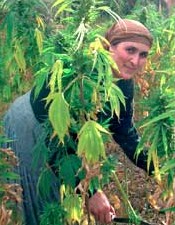Since at least the 15th Century, farmers in Morocco's Rif Mountains have been growing marijuana, which they typically process into hashish. For decades, Moroccan hash has been a mainstay of European marijuana markets. In recent years, production reached a peak of 135,000 hectares in 2003 before declining to about 60,000 hectares this year and last in the face of aggressive government efforts to eradicate crops and break up trafficking organizations.

On Wednesday, December 3, Moroccan Television's second station, 2M, broadcast a live debate on possible approaches to cannabis cultivation called "Cannabis and Hashish: What Approach To Take?" Participating in the discussion were Khalid Zerouali, executive director of migration and customs; Chakib Al Khayari, president of the Association for Human Rights in the Rif region, Professor Mohamed Hmamouchi, director of the National Institute of Medicinal Plants; Hamid El Farouki, director of development at the Agency for Promotion and Development of the Northern Region; and researcher Abderrahman Merzouki.
According to a report on the debate made available by the European Coalition for Just and Effective Drug Policies (ENCOD), the panelists discussed three questions:
- To what degree have alternative development projects been able to support the populations in replacing their illicit traditions?
- Is it possible to direct the cultivation of cannabis towards therapeutic and industrial uses and, in a general way, towards an alternative economy in these regions?
- What is the role of regional and international cooperation in this domain?
While government ministers Zerouli and El Farouki called eradication programs a success, citing a 55% reduction in cultivation since 2003, human rights advocate Al Khayari characterized that figure as "not realistic." He said new marijuana fields that had not been counted had sprung up in various regions. Merzouki supported this opinion, and denounced human rights violations against farmers whose fields were eradicated. The law enforcement approach should immediately be replaced by a social approach, he said.
Al Khayari added that alternative development projects tried for the past quarter-century have had some successes, but have not managed to blunt marijuana production. Part of the problem, he said, is that such products are limited. Another part of the problem was that the project designers and managers have not taken into consideration the economic problems and cultural traditions of marijuana cultivation areas.
According to Al Khayari, cannabis cultivation in the Rif predates the arrival of the Arabs. Even the porters of the Koran pray to Allah to protect their sacred plant, he noted.
Professor Hmamouchi insisted that lack of basic infrastructure in some producing regions, a result of the traditional marginalization of the Rif, were a fundamental impediment to alternative development programs. Hmamouchi proposed a larger investment in the National Initiative for Human Development to develop new projects that could help the producing regions.
As the debate wound down, human rights advocate Al Khayari proposed legalizing marijuana as the only practical solution for the traditional producing regions, a view that was seconded by Hmamouchi. Legalization should come within a framework that would regulate cultivation and allow for medicinal and industrial (hemp) cultivation, said Al Khayari.
Even Customs Minister Zerouli agreed that it was a provocative idea for the historical producing regions. He said he would discuss the notion in a more profound way with the participation of civil society as a means of reducing illicit drug trafficking.
Meanwhile, cultivation continues, as do eradication and arrests. And some 800,000 Moroccans derive at least part of their income from it.
This work by StoptheDrugWar.org is licensed under Creative Commons Attribution-ShareAlike 4.0 International
Comments
Look to the US
Our so called leaders house/senate spend millions worldwide to impose our drug stradegy on other countries it would not surprise me if our country did not have a hand here. We spent 55 million paying one country to make marijuana illegal in a country where it was causing no problem. We just gave Mexico 400 million to eradicate marijuana plants. I think this war is our out of hand. The sad part is all this money and hardships brought to other countries is all for corporate greed. The major drug companies would lose billions and they direct most of the drug policy world wide. It is all to protect their profits and enslave people for exercising freedom of choice our right. Stop the War on US (drugs) and help the rest of the world adopt fair drug regulation.
Cherokee Fred Hussein
Give me liberty or give me death!
In reply to Look to the US by Anonymous (not verified)
Big Up!
Burn down the system, keep the fire burning!
the big picture
what's really happening is that the european cartels want to monopolize the market, and the rif farmers are getting the worst of it.
God Bless Hashish
AND god damn all prohibitionists and drug warriors.
when the stress burns my
when the stress burns my brain just like acid raindrops maryjane is the onlything that makes the pain stop
Holland has it right
The Dutch government makes millions every year from Cannabis sales. 52% tax.
this cash is then used to fight hard drugs. Both treatment for the addicts and jail for the dealers.
Cannabis makes you live longer and be happier.
fuk u all
hahahha jk o omg i wish weed was legal lik totally
Add new comment